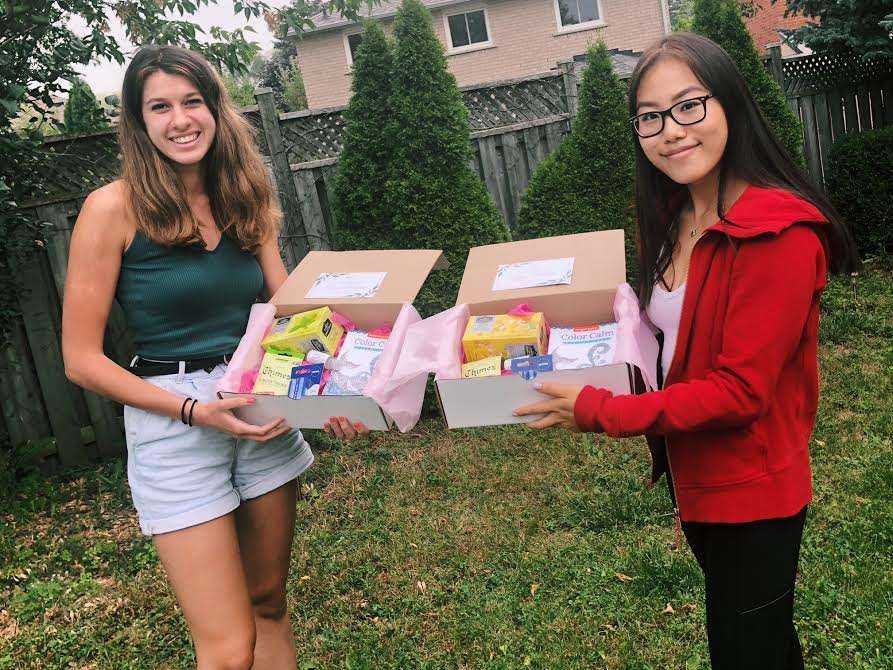BY MARCEL MARIAK
How two young women are making a difference in their community.
Every day in Canada, 75 women have their world turned upside down with a single fateful sentence: “You have breast cancer.” At that moment, they become a victim of a disease that will be fatal for nearly one out of every five patients. For the next few months or even years, cancer will become a looming reality as they fight for survival and battle the side effects of radiation and chemotherapy. They will spend a great many hours in hospitals, waiting rooms, and labs awaiting lifesaving treatment. Usually, the dread of hospital beds, beeping machines, and prolonged therapy sessions is eased by the presence of family and friends. But with the coronavirus pandemic forcing hospitals to shut down visitations, cancer patients spend days and even weeks without contact with loved ones. Luckily, a pair of young women are making a difference in the lives of breast cancer victims with their organization: Boxes of Bravery.
What are Boxes of Bravery?
Boxes of Bravery is a charity started by two high school students, Annie Liu and Madeline Catapano, in the autumn of 2019. Both ladies became passionate about helping cancer victims after they experienced struggles with the disease in their own families. Madeline’s mother is a breast cancer survivor, and Annie’s grandfather passed away from cancer, so improving the lives of cancer patients is a mission that hits close to home. Their non-profit organization specializes in delivering much needed “care packages” to breast cancer patients. Annie and Madeline were inspired to create boxes after they heard of people making care packages for the homeless. The young ladies started by raising money from their family and friends to fund the packages and eventually made their mission a community-wide initiative. Earlier this week, I had a chance to talk with the founders about their motivation behind Boxes of Bravery, “I really wanted to reach out and help people in need,” said Annie, “especially those who are being overlooked in today’s society.” Each Box of Bravery is filled with items that help women in their fight against breast cancer. Since the organization was started a year ago, Boxes of Bravery’s care packages have changed over five-dozen lives, with more boxes being funded and delivered every day!
What’s in a Box?
Every Box of Bravery is packed with chemo, radiation therapy, and hospital essentials. These items comfort and support cancer patients while they undergo treatments. Every Box of Bravery contains the following goodies: lip balm packed with natural oils to help moisturize after dehydrating chemotherapy, additive-free ginger candies to prevent post-chemo nausea symptoms, gentle herbal teas to combat an upset stomach, a premium “thousand wishes” hand sanitizer from Bath & Body Works, an adult colouring book to help fend off boredom during extended periods without loved ones, and an intimate card from the founders with a positive and uplifting message to remind patients they aren’t alone.
How can I get involved?
The best way to participate in the Boxes of Bravery initiative is by visiting their website, www.boxesofbravery.org. From there, you have access to many forms of getting involved with the organization. The most common way of helping Boxes of Bravery improve the lives of breast cancer patients is by purchasing a care package directly from the website. You can then select whether you’d like the box to be donated to a hospital or to be given to a loved one who’s fighting cancer. Boxes of Bravery operates on a pay-it-forward basis, where most people who buy a personal Box of Bravery for a loved one usually also fund one to be donated to a hospital. Another initiative that Boxes of Bravery offers to help fund boxes is the Scrunchie Fundraiser, where they sell vegan silk hair scrunchies and put all proceeds towards creating and delivering Boxes of Bravery.
If you want to help spread the word about Boxes of Bravery or contact the organization, you can find them on Instagram @boxesofbravery and use the hashtag #WarriorWednesday. If you have any items that you’d like to donate to be added to the boxes or to ask a question, send an email to boxesofbraverycharity@gmail.com. Every penny you contribute to the organization helps countless breast cancer patients bravely continue the fight against this awful disease. Visit www.boxesofbravery.org and start changing lives today!

